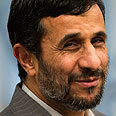
Time for Arab-Israeli partnership on Iran
To promote peace, US should first focus on building Arab-Israeli anti-Iran alliance
During the November 2007 Annapolis Conference, Haaretz Correspondent Avi Issacharoff properly summed up the attendance of the Saudi participants. “They showed up not because they love us (the Israelis,) but because they hate the Iranians more.” There is an important strategic reason to bring Arabs and Israelis back to the negotiating table now. Because both parties fear a nuclear Iran, the time is ripe for a trilateral partnership between Israel, the Gulf Co-Operation Council (GCC) states, and the US.
In February, during US Secretary of State Hillary Clinton’s trip to the Persian Gulf, Saudi Arabian Foreign Minister Prince Saud al-Faisal expressed his concern that, “We need an immediate resolution rather than a gradual resolution.” Israeli Defense Minister Ehud Barak has expressed similar sentiments. In response to these concerns, the US has made assurances to protect both its allies in Israel and the Persian Gulf from any Iranian aggression.
Next week, when US Special Envoy to the Middle East George Mitchell returns to the region to promote indirect peace negotiations between Israelis and Palestinians, he should focus on promoting dialogue in an area of mutual interest to Americans, Arabs, and Israelis. A trilateral partnership should be formed between Israel; the GCC comprising Bahrain, Kuwait, Oman, Qatar, Saudi Arabia and the United Arab Emirates; and the US to counter the Iranian threat of instability in the Middle East. This partnership should then be used as leverage for the US Administration to push for Arab-Israeli peace negotiation.
Predominantly Shiite Iran has historically strained relations with several Sunni Arab states; Iranian President Mahmoud Ahmadinejad has repeatedly stated he wants to “wipe Israel off the map.” Both Israeli Prime Minister Benjamin Netanyahu and Prince Saud al-Faisal have expressed concerns to the US administration that United Nations Security Council efforts to impose a fourth round of sanctions on Iran are not happening quickly enough. President Obama would be wise to respond to these concerns by initiating a trilateral partnership.
New backdoor channel
US President Barak Obama should utilize the reminder of this week to garner support for this partnership. He should approach this issue with his allies from the perspective of a mutual defense partnership. If Obama first guarantees the GCC countries and Israel defensive support in the event of any Iranian aggression, he will then be in the position to suggest a trilateral regional conference to discuss other issues of mutual concern. Although the conference will not focus on Arab-Israeli peace negotiations per se, a new backdoor channel will be opened for diplomacy.
This trilateral partnership will have several benefits. The primary one will be regional collaboration of countries working to prevent the establishment of a nuclear Iran. The US could work with its GCC partners to assure China and Russia, the two remaining members of the United Nations Security Council hesitant to approve a new round of sanctions against Iran, a continuous flow of oil, even if new sanctions are implemented.
A nuclear Iran threatens the stability of both Israel and its Arab neighbors alike. By working together, and with the support of the greater international community, Americans, Arabs, and Israelis could counter this threat. The mutual concern shared by Israel and the GCC countries must now be taken advantage of to propel the stalled Arab-Israeli peace negotiations forward.
Sara Reef is a Project Manager at Intersections International specializing in intercultural communications










